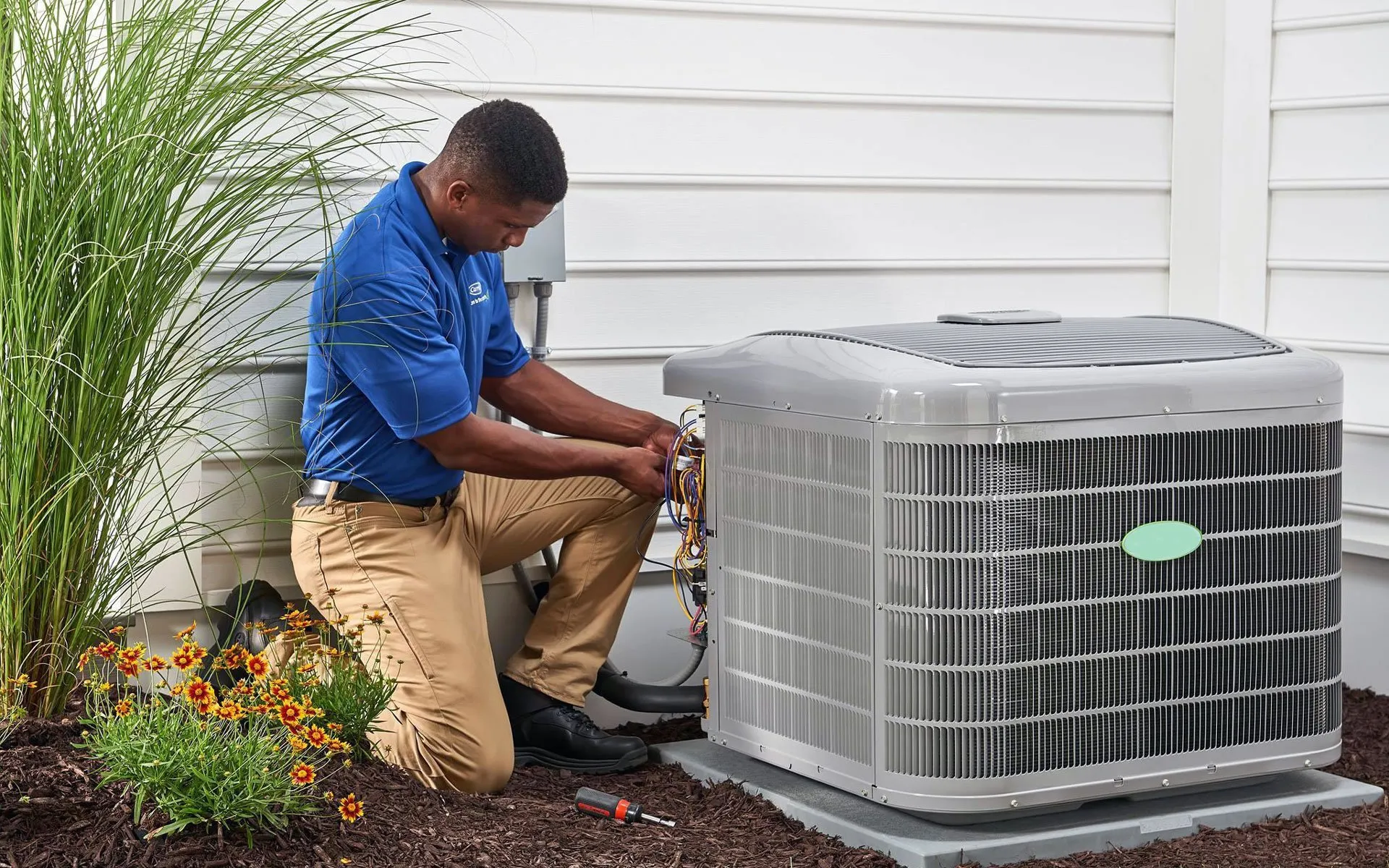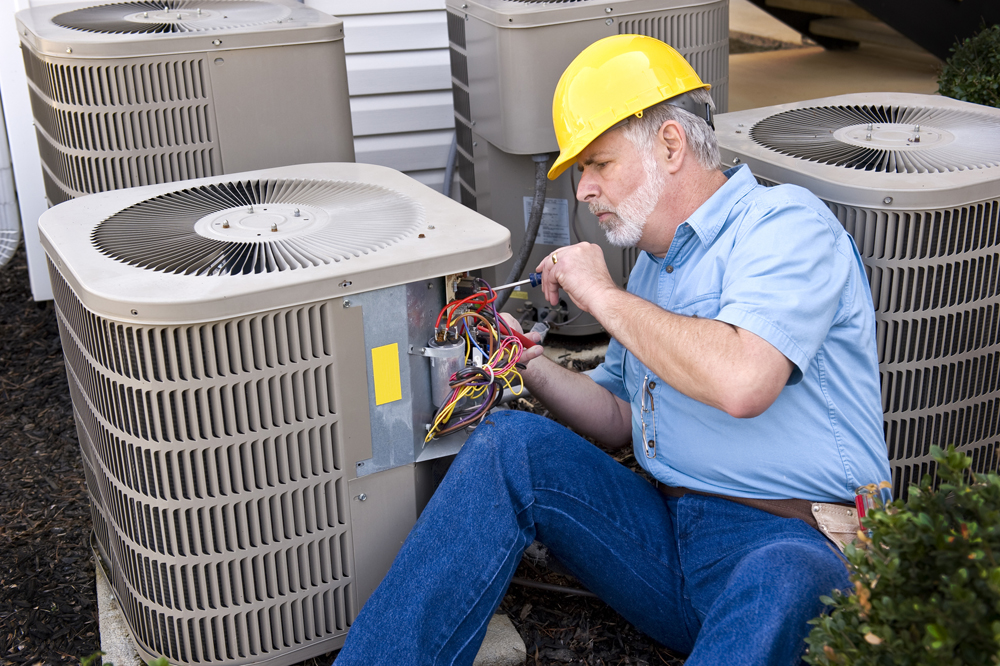How a Heatpump and Furnace Job With Each Other to Enhance Your Home's Heating Effectiveness
Comprehending how a warmth pump and heating system work together is essential for home owners looking for effective heating remedies. Each system has its staminas, supplying a well balanced technique to home comfort. The heatpump succeeds in moderate temperature levels, while the heater supplies fast warmth during severe cold. This harmony not just lowers power prices but also boosts the lifespan of both devices. What elements affect this partnership, and how can homeowners maximize their advantages?
Recognizing Warm Pumps: Just How They Work
Many people may be strange with their internal operations, heat pumps play an essential role in contemporary home heating systems. These tools operate by moving heat from one location to another, using the principles of thermodynamics. In chillier months, a heat pump essences heat from the outdoors air, ground, or water, and transfers it inside to warm the home. Conversely, during warmer months, it can turn around the procedure, functioning as an a/c unit by expelling warm from inside to the outside.Heat pumps consist of an evaporator, development, compressor, and condenser shutoff. The refrigerant within the system soaks up heat as it evaporates at low temperatures and pressures. The compressor then boosts the stress and temperature of the refrigerant, enabling it to release warm as it condenses. This reliable procedure can significantly decrease energy usage compared to conventional heating techniques, making warmth pumps a lasting option for climate control in homes.
The Function of Heating Systems in Home Home Heating
Heating systems play a necessary role in home heating by providing a trustworthy resource of warmth throughout the chillier months. They operate by producing warm with combustion or electrical resistance, distributing it throughout the home through ducts or radiant systems. The performance of a heater is usually measured by its Annual Gas Usage Effectiveness (AFUE) score, which shows just how efficiently the system converts fuel right into heat.Furnaces can utilize various energy sources, consisting of natural gas, oil, power, or gas, enabling homeowners to select one of the most suitable alternative for their requirements. Unlike heatpump, which might have a hard time in extreme cool, furnaces keep consistent performance, making certain that indoor temperature levels remain comfortable no matter outdoor conditions. Furthermore, modern-day heaters often come outfitted with innovative innovation, such as variable-speed blowers and clever thermostats, boosting their efficiency and responsiveness. This adaptability makes heaters a critical element in comprehensive home heating strategies.

Benefits of Using Both Equipments With Each Other
Combining the staminas of both heaters and heatpump can result in a much more reliable and effective home heating service. Utilizing both systems permits house owners to benefit from the heatpump's energy performance throughout milder temperatures while depending on the heating system for more severe cold conditions. This twin strategy can substantially minimize energy costs, as heatpump consume much less electrical energy than conventional home heating approaches when temperature levels are moderate.Additionally, utilizing both systems together can improve comfort degrees in the home. Heatpump can give regular, even home heating, while furnaces can quickly raise ambient temperature levels when required. Additionally, the combination of both systems can extend the life-span of tools by reducing deterioration on each system, as they share the work. Eventually, home owners can take pleasure in a balanced, economical heating service that adjusts seamlessly to differing weather problems, making sure a cozy and inviting home throughout the winter season.
Exactly How Heat Pumps and Furnaces Enhance Each Various Other
When house owners incorporate warm pumps and heating systems, they develop a corresponding heating unit that makes best use of effectiveness and comfort. Warm pumps run by transferring warm from the outside air or ground, making them extremely reliable in modest climates. They stand out during milder temperatures, providing affordable heating. Conversely, heating systems produce heat with burning or electric resistance, providing strong, prompt heat during extreme cool conditions.The mix of these 2 systems permits vibrant adjustments based upon temperature fluctuations. Throughout warmer months or milder winter season days, the heatpump can take the lead, conserving energy and lowering costs. As temperature levels drop, the heater can perfectly involve, ensuring regular heat throughout the home. This harmony not only enhances power usage yet additionally improves the life-span of both systems, as each device runs within its suitable efficiency variety. With each other, they produce a balanced environment that adjusts to differing environment demands.
Maximizing Efficiency: Tips for Homeowners
Home owners can improve their heating effectiveness with a number of useful approaches. Establishing a routine upkeep routine, incorporating smart thermostat modern technology, and implementing effective insulation and sealing options are essential steps. These steps not only boost comfort yet also decrease energy costs.
Routine Upkeep Schedule
To guarantee optimal home heating efficiency, establishing a regular maintenance timetable is essential for any kind of home. Home owners need to prioritize routine examinations of both heatpump and heaters to ascertain peak performance. This includes transforming air filters every one to 3 months, as clogged up filters can significantly decrease efficiency. In addition, organizing my link expert upkeep a minimum of once a year permits professionals to recognize and attend to potential concerns before they escalate. Homeowners need to likewise cleanse the warm pump's exterior system to avoid debris accumulation that can impede air flow. By adhering to a normal upkeep timetable, homeowners not only enhance their heating systems' efficiency but also expand their lifespan, causing better comfort and decreased power prices throughout go now the chillier months.
Smart Thermostat Integration
Incorporating a clever thermostat into a home heating unit can considerably improve energy performance, particularly as it enables specific control over temperature level settings. These tools can discover the homeowner's routine and choices, immediately adjusting the temperature level to maximize comfort while decreasing power use. They can decrease heating during times when the home is empty, lowering unnecessary consumption. Several wise thermostats additionally supply real-time power use data, enabling home owners to make educated decisions concerning their heating routines. In addition, remote gain access to by means of smartphone apps enables individuals to adjust settings from anywhere, guaranteeing the home is cozy upon return. In general, smart thermostat assimilation not only improves comfort but significantly adds to power savings and performance.
Insulation and Securing Solutions
Smart thermostats play a critical function in power effectiveness, yet their effectiveness can be considerably improved by correct insulation and securing options. Homeowners need to prioritize shielding attics, floorings, and walls to lessen heat loss. High-grade insulation products, such as spray foam or fiberglass, can significantly enhance thermal resistance. Furthermore, sealing gaps around ducts, doors, and windows protects against cold air seepage and warm getaway. Weatherstripping and caulking work approaches for dealing with these leakages - ductless mini splits. Regular examinations for air leakages, in addition to using blower door examinations, can aid determine problem locations. By buying insulation and sealing, homeowners can enhance the performance of their furnace, eventually bring about lowered energy consumption and reduced utility costs
Common Myths Regarding Warmth Pumps and Furnaces
What misconceptions surround warm pumps and heaters? Many people incorrectly think that warmth pumps are inefficient in cooler environments. In truth, modern heat pumps are designed to run effectively even in reduced temperature levels, supplying reputable heating throughout winter months. One more common misconception is that heating systems are always more reliable than heatpump. However, this depends on the certain energy sources and performance ratings of the units in question. Some may additionally believe that using both systems all at once is unneeded, however in reality, this combination can enhance heating performance, particularly throughout severe weather condition problems. Additionally, individuals frequently assume that warmth pumps need consistent maintenance, when in reality, they have similar upkeep needs to typical heater. By debunking these misconceptions, homeowners can make more enlightened decisions regarding their home heating options, eventually leading to improved convenience and power effectiveness in their homes.
Upkeep Factors To Consider for Combined Systems

Regularly Asked Concerns
Can Warm Pumps Job Successfully in Very Cold Climates?
Heatpump can battle in very chilly climates due to minimized efficiency and heat removal constraints. Nonetheless, advancements in modern technology have caused versions created for much better efficiency in such conditions, enhancing their feasibility in harsh atmospheres.
The Length Of Time Do Warmth Pumps and Furnaces Typically Last?
Heatpump commonly last 15 to twenty years, while furnaces have a life expectancy of 15 to three decades. Regular upkeep can expand their durability, making sure effective procedure and reducing the need for premature replacements.

What Is the Average Expense of Setting Up Both Systems?
The average price of mounting both a heatpump and a furnace generally varies between $5,000 to $10,000 - heat pump replacement ooltewah tn. Elements affecting this expense include system size, installment intricacy, and regional labor prices
Are There Tax Obligation Incentives for Using Energy-Efficient Home Heating Equipments?
Several homeowners ask about tax obligation rewards for energy-efficient heating systems. Different federal and state programs commonly offer refunds or credit scores, motivating the adoption of lasting innovations to lower energy intake and promote ecological obligation.
Just how Do I Select the Right Size Heatpump and Heating System?
Selecting the ideal size heatpump and heater includes determining the home's square footage, taking into consideration insulation quality, and examining regional climate. Consulting a specialist can ensure perfect system efficiency and energy effectiveness based upon certain demands. heat pump replacement ooltewah tn. Understanding just how a warm pump and heater work together is important for house owners looking for effective home heating services. In cooler months, a heat pump extracts heat from the outside air, ground, or water, and transfers it indoors to heat the living area. When house owners integrate heat pumps and heaters, they create a corresponding heating system that optimizes efficiency and convenience. Warmth pumps run by transferring warm from the outdoors air or ground, making them highly efficient in modest climates. Warm pumps can struggle in very cold climates due to minimized effectiveness and heat extraction restrictions